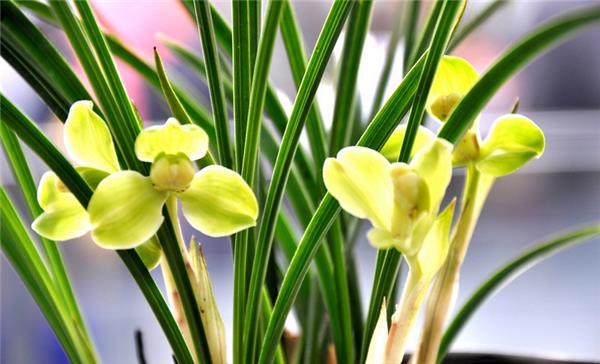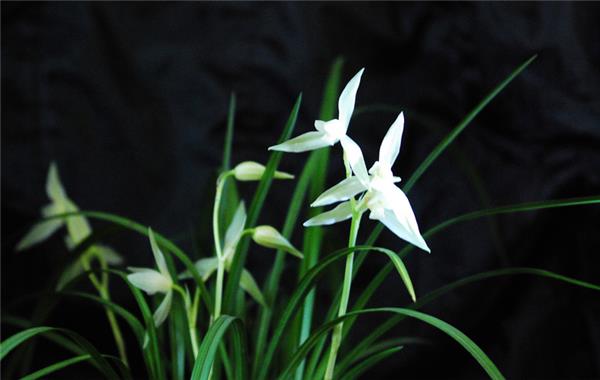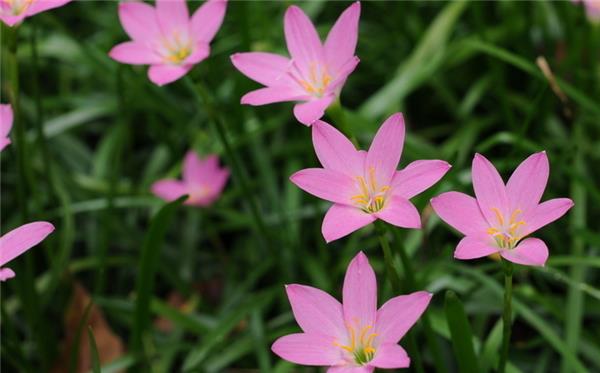The planting skills of orchids introduce how to cultivate beautiful orchids
Orchids because of temperament refined, loved by the majority of flower lovers, but because the orchid system is delicate, breeding requires a lot of brains, the following we will introduce the methods of orchid culture.

1. Place
The place where orchids are placed is very important, which directly affects the growth and development of orchids. Orchids are generally placed in the open field in spring, summer and autumn (shaded in the open field in summer) and indoors in winter. It is best to be open and moist outside. There should be plenty of light in the room, preferably facing south. In this way, it is beneficial for orchids to grow. The orchid basin had better be put on the wooden frame or table, not on the ground.
2. Shade
Orchids are mostly semi-negative plants, and most species are afraid of direct sunlight and need proper shade. Orchids can shine more sunshine to promote their growth in the first and middle of April. It should be properly shaded after late April. The varieties of erect leaves in Xialan and Qiulan had better be placed in the south of the shade so that they are properly exposed to more sunlight, while those with vertical leaves are better exposed to two hours of light every day. From June to September, you should cover the shade early every day. If you use Reed curtains, you can use dense curtains or two thin curtains. After October, the weather turns cool and the sun is weak, which can postpone shading, but we still need to pay attention to shading around noon.

3. Rain protection
Orchids can be caught in light rain, but to avoid mildew, showers or continuous rain. In the mildew and rainy season, especially to do a good job of rain prevention. From late June to mid-September, there are frequent showers. If it rains for a short time and the rainfall is small, it should be watered more in the evening to discharge the hot air in the basin, otherwise the orchid will be damaged or even withered. If the sun comes out again after the shower, it should be shaded in time to avoid the rising heat on the ground affecting the growth of orchids.
Rain Water's season coincides with the stage when orchids sprout leaf buds. If the pot soil is too warm, it will cause poor leaf bud growth or lead to diseases. At this time, you can sprinkle a small amount of plant ash to adjust the humidity of the basin soil.

4. Watering
The flower proverb says, "dry orchid and wet chrysanthemum", which has a certain degree of truth. Generally speaking, it is best for orchids to be eight minutes dry and two parts wet. If it is too wet, it is easy to make the flowers rot and die. The principle of watering should be: dry, wet, stop, properly dry. When mastering specifically, it should be paid attention to: in the growing period (the end of May-June), more watering should be appropriate, less watering should be appropriate in the budding period of leaves (about 3-4 months) and flowering period (about 3-4 months), and less watering or no watering should be done in the dormant period (winter). Those with large flowerpots and small orchid plants should be watered less, and those with small pots should be watered more. Hot and dry climate should be properly watered, cool and humid (such as mildew and rainy season, etc.) should be less or no watering. For orchids newly dug from the mountains, if there are few or more broken roots, they should be watered less to dry the pot soil, so that the roots will not rot and it is conducive to the emergence of new leaves.

The above is the breeding skills of orchids. It takes enough patience and skill to cultivate orchids. Have you learned it?
Related
- Wuhan Hospital Iron Tree Blooming Result Was Instantly Frightened by the Gardener Master
- Which variety of camellia is the most fragrant and best? Which one do you like best?
- What is the small blue coat, the breeding methods and matters needing attention of the succulent plant
- Dormancy time and maintenance management of succulent plants during dormancy
- Minas succulent how to raise, Minas succulent plant pictures
- What are the varieties of winter succulent plants
- How to raise succulent plants in twelve rolls? let's take a look at some experience of breeding twelve rolls.
- Attention should be paid to water control for succulent plants during dormant period (winter and summer)
- Watering experience of twelve rolls of succulent plants
- Techniques for fertilizing succulent plants. An article will let you know how to fertilize succulent plants.



